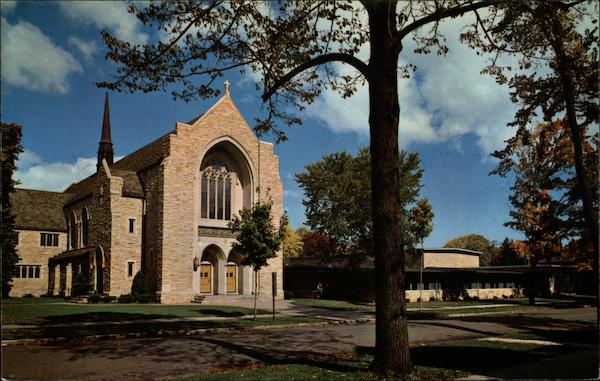Helping Smaller Churches

The Church sometimes uses a hub and spoke model of ministry. In it a central congregation serves as the hub of a wheel with spokes radiating outwards in all directions.

Zion Lutheran Church in Wausau began helping smaller congregations a few years back. Wausau is a big city for North-Central Wisconsin. Zion is also located a manageable driving distance to a handful of smaller congregations. A couple of years ago one congregation reached out to us for pastoral support and services. At the time Zion had three pastors and the smaller church was struggling to find pulpit supply. After much prayer, the meeting of the councils, congregational meetings, and a mutually agreed upon contract we started to share our pastoral services, support, and love with more brothers and sisters in Christ.

Zion serves as the larger (hub) church. The other church is a smaller (spoke) church located about 15 miles east. Each church retains its own autonomy (councils, calendars, actives, etc.). And each church shares in the pastoral leadership and support of 2 full-time pastors and 1 part-time, retired pastor. Between the two churches, every single worship service is led by an ordained pastor. Shut-ins are visited. Sunday schools run unabated. Word and Sacrament are freely shared.
This is why I left you in Crete, so that you might put what remained in order, and appoint elders in every town as I directed you.
Titus 1:5
Larger, hub-like churches and rural, spoke-like churches may want to consider doing something like this too. If so, Zion has some practical advice for you.
For the hub church and pastoral staff:
- Pastors are to be the harvesters out among the wheat fields! As a pastor of a hub church, yes, you are primarily called to (and paid by) this congregation. However, don’t let that limit the scope of how you can serve Christ’s Church more broadly. There are “other sheep” out there.
- Church councils care for the well being of their own church, and also the well-being of their pastor. Thanks be to God! But remember, Christ’s Church is bigger than your own slice of the kingdom. We must care for the “least of these, my brothers” who are without adequate pastoral support. What will the Lord say to us if we neglect them at such a time as this?
- You are a congregation with resources – thanks be to God! Those resources can be used in supporting smaller, rural congregations with leadership – pastoral, musical, educational, or otherwise.
- This will make pastors a bit busier, but it is good to be busy for the sake of the Kingdom of God! Of course, one must weigh the demands of two (or more) congregations appropriately. Pastors can’t be everywhere and do everything. This means the hub church will be willing to receive a little less attention from their pastor(s) because they are sharing it with another church.
- It will be important for the membership of the hub church to know what their pastor(s) are doing at the spoke church. They are invested too and need to be kept in the loop.
For the spoke church:
- Help is not on the way. Pastoral shortages, baby-boomer retirements, and a myriad of other issues have brought us to where we are today. Grieve it and move on. This is one model (hub and spoke) which might be able to make things work given the current circumstances.
- God loves your church, no matter what size. You exist to glorify God where you are at. God also loves bigger churches too. They can help you. Never be ashamed to ask for help from your brothers and sisters in Christ.
- Having pastoral support is essential for keeping vitality in a church. Churches can flounder without a shepherd or waiting for one. If you are a rural church, you know how long it takes to get a pastor and chances are, depending on your denominational affiliation, you are low on the priority list. Be proactive – find a larger congregation in your vicinity that might be willing to share their pastor. You never know unless you ask!
- If you do connect with a bigger church, know that the primary loyalty of the pastor will be to the congregation they are called to. Don’t expect this pastor to now devote 40 hours a week to your congregation. An agreed upon contract will make clear what you can and cannot expect from a pastor or a pastoral team.
- Be willing to be flexible to make things work. If you want a pastor to preach and preside at the Supper, changing the time you worship, even if you’ve worshiped at that time for the past 50 years, might be necessary.
- You have resources too! Partnering with a larger church does not now mean their pastor is cheap labor. Be as heavily invested in this partnership as possible. Be generous in how you compensate the larger church in their pastoral support of your congregation. You may not be able to compensate a full-time, benefits included pastor, but you just might enable the larger church to do that very thing. Everyone wins!
- Remember what is central for the Church: Receiving Jesus Christ and the gifts He gives in Word and Sacrament. Your worship life will have a renewed sense of importance because of this partnership. Worship will be the main area of concentration for the pastor who is helping you out.
Remember, we are not entering uncharted territory. Nor are we entering into unprecedented times. The Church has weathered far worse challenges than what we face today. This doesn’t make light of the current struggles but puts it into perspective. It is God’s will that His Church grow and flourish. May this good and gracious will of God be done among us as we look at newer (or older!) models of making ministry happen.

